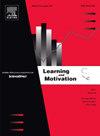Cultivating motivation in informal learning via YouTube: Effects of reinforcement learning-based and social learning-based approaches
IF 1.7
4区 心理学
Q3 PSYCHOLOGY, BIOLOGICAL
引用次数: 0
Abstract
This study sought to address the research question of whether reinforcement learning-based YouTube and social learning-based YouTube significantly enhance the motivation of Chinese higher education learners in informal learning contexts, while also exploring how these approaches influence motivation from the learners’ own perspectives. A mixed-methods design was employed where the data were collected through a pre- and post-test motivation survey and semi-structured interviews. The participants across all groups accessed 11 selected YouTube videos; EG1 received reinforcement feedback, EG2 was guided to emulate modeled behaviors from the videos, and the CG received no additional intervention. Quantitative data were analyzed using ANOVA, while qualitative responses underwent a content analysis. The quantitative findings revealed that both EG1 (i.e., reinforcement learning-based) and EG2 (i.e., social learning-based) demonstrated statistically significant gains in motivation compared to the CG on the post-test. Qualitatively, the learners in the EG1 reported heightened motivation linked to increased confidence stemming from reinforcement feedback, whereas the EG2 participants highlighted cooperative learning, greater engagement, and enhanced autonomy as key outcomes of social learning strategies. The study’s results evidenced that both reinforcement- and social learning-based approaches, when integrated with YouTube, effectively bolster the higher education learners’ motivation in informal contexts. The implications of these findings are substantial: educators and course designers can leverage specific YouTube-based strategies, such as structured feedback or modeling to optimize higher education learners’ motivation, confidence, engagement, and autonomy.
通过YouTube在非正式学习中培养动机:基于强化学习和基于社会学习方法的效果
本研究旨在探讨基于强化学习的YouTube和基于社交学习的YouTube是否显著提高了中国高等教育学习者在非正式学习环境中的学习动机,同时从学习者自身的角度探讨这些方法如何影响学习者的学习动机。采用混合方法设计,通过测试前和测试后的动机调查和半结构化访谈收集数据。所有小组的参与者都观看了11个选定的YouTube视频;EG1接受强化反馈,EG2被引导模仿视频中的行为模型,CG不接受额外干预。定量数据分析采用方差分析,而定性反应进行内容分析。定量结果显示,与CG相比,EG1(即基于强化学习的)和EG2(即基于社会学习的)在测试后的动机上都有统计学上的显著提高。从质量上讲,EG1中的学习者报告了强化反馈带来的更高的动机和信心,而EG2的参与者强调合作学习、更大的参与和增强的自主性是社会学习策略的关键结果。该研究的结果证明,强化和社会学习的方法,当与YouTube相结合时,有效地增强了高等教育学习者在非正式环境中的动机。这些发现的意义是重大的:教育工作者和课程设计师可以利用特定的基于youtube的策略,如结构化反馈或建模,以优化高等教育学习者的动机、信心、参与度和自主性。
本文章由计算机程序翻译,如有差异,请以英文原文为准。
求助全文
约1分钟内获得全文
求助全文
来源期刊

Learning and Motivation
Multiple-
CiteScore
2.90
自引率
0.00%
发文量
53
期刊介绍:
Learning and Motivation features original experimental research devoted to the analysis of basic phenomena and mechanisms of learning, memory, and motivation. These studies, involving either animal or human subjects, examine behavioral, biological, and evolutionary influences on the learning and motivation processes, and often report on an integrated series of experiments that advance knowledge in this field. Theoretical papers and shorter reports are also considered.
 求助内容:
求助内容: 应助结果提醒方式:
应助结果提醒方式:


